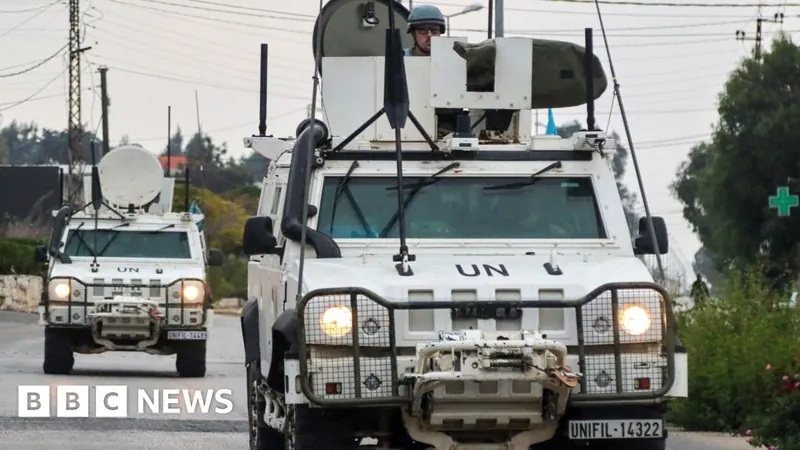
Tensions Escalate as US Pleads with Israel to Cease Fire on UN Peacekeepers in Lebanon
2024-10-12
Author: Jia
Introduction
In a dramatic escalation of the ongoing conflict in Lebanon, US President Joe Biden has made an urgent appeal for Israel to halt its fire directed at UN peacekeepers. This call comes on the heels of two alarming incidents within just 48 hours in which UN soldiers were injured.
Recent Incidents Involving UN Peacekeepers
On Friday, the Israel Defense Forces (IDF) admitted responsibility for an attack that injured two Sri Lankan soldiers from the UN Interim Force in Lebanon (Unifil). Israeli troops, operating near a UN base in Naqoura, opened fire after perceiving a threat. The IDF has pledged an investigation at the highest levels regarding this incident.
The situation worsened on Thursday when two Indonesian Unifil soldiers suffered injuries after falling from an observation tower, which was struck by enemy fire from an Israeli tank. This pattern of aggression has led to widespread condemnation from international leaders. A joint statement from France, Italy, and Spain labeled Israel's actions as "unjustifiable," calling for an immediate cessation of such hostilities.
International Reactions and Condemnation
Sri Lanka's foreign ministry echoed this sentiment, unequivocally condemning the IDF's attack on its personnel. The head of UN peacekeeping pointed out that there is substantial reason to suspect that some of the fire targeting UN positions in southern Lebanon appeared to be deliberate, though he refrained from assigning separate blame for the incidents.
Mounting Casualties and Escalation
As tensions flare, casualties continue to mount on both sides. Lebanese health officials reported that an Israeli air raid on the southern city of Sidon resulted in the deaths of three individuals, including a two-year-old girl. The Lebanese army confirmed the deaths of two soldiers after Israeli forces targeted an army outpost.
Meanwhile, in Beirut, emergency responders are working tirelessly to sift through the wreckage left by Israeli airstrikes, which allegedly resulted in 22 civilian fatalities and injured 117 others on Thursday alone, according to Beirut officials. The Israeli military has remained silent regarding these allegations of civilian casualties.
Context of the Conflict
The conflict has escalated significantly since Israel launched a ground invasion into southern Lebanon last month in response to cross-border rocket fire from Hezbollah. Since then, the exchange of fire has become a daily occurrence, sharply intensifying following Hamas's devastating attack in southern Israel in October.
Responses to Rocket Fire and Israeli Justifications
The IDF reports that it detected about 100 rockets from Lebanon targeting northern Israel within half an hour on Friday, in addition to thwarting an attempted drone incursion from the north. In a significant rebuttal to the claims of inadequate protection provided by UN forces, Israeli officials have stated that the UN post hit in Naqoura was only 164 feet away from what they deemed a legitimate threat.
UN's Position and Peacekeeping Efforts
Despite Israel’s insistence that Unifil has failed to stabilize the region, with calls for peacekeepers to withdraw, the UN has reiterated its commitment to maintaining its current position in Lebanon. Approximately 10,000 peacekeepers from 50 nations, supported by 800 civil staff members, are present in the region, tasked with monitoring the area between the Litani River and the UN-recognized boundary known as the Blue Line.
Conclusion and Outlook
The cycle of violence shows no signs of abating, especially as Hezbollah reiterates it will continue to retaliate as long as attacks on Palestinians persist. Tensions remain extremely high as both sides brace for what may come next in this increasingly volatile situation. Could this conflict escalate into a larger regional war? The international community is watching closely as events unfold.


 Brasil (PT)
Brasil (PT)
 Canada (EN)
Canada (EN)
 Chile (ES)
Chile (ES)
 España (ES)
España (ES)
 France (FR)
France (FR)
 Hong Kong (EN)
Hong Kong (EN)
 Italia (IT)
Italia (IT)
 日本 (JA)
日本 (JA)
 Magyarország (HU)
Magyarország (HU)
 Norge (NO)
Norge (NO)
 Polska (PL)
Polska (PL)
 Schweiz (DE)
Schweiz (DE)
 Singapore (EN)
Singapore (EN)
 Sverige (SV)
Sverige (SV)
 Suomi (FI)
Suomi (FI)
 Türkiye (TR)
Türkiye (TR)